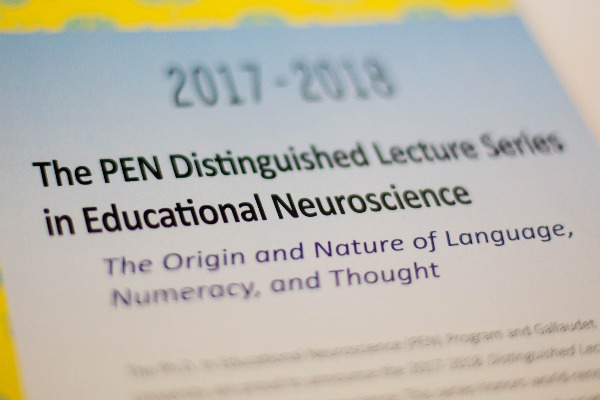PEN Distinguished Lecture Series
The PEN Distinguished Lecture Series in Educational Neuroscience was created in association with the Foundations Proseminar course for graduate students in the Ph.D. in Educational Neuroscience (PEN) program. Since its inception, the series has grown!
The lecture series focuses on the intersection of the Science of Learning (learning across the lifespan) and Educational Neuroscience (learning across early life). Scientists and researchers who are pioneers in the fields of Cognitive-Educational Neuroscience, Developmental Cognitive Neuroscience, and Child Development come to Gallaudet University's campus to talk about their research.
Register for Upcoming Lectures
All lectures are open to the public and are video recorded for online distribution.
PEN DLS brochure for 2024-2025
Where did language come from? Evolutionary precursor mechanisms in the brain of nonhuman primates

With all its uniqueness in humans, language and music must have its evolutionary origins in nonhuman animals. Dr. Rauschecker contends that it makes sense to search for traces of brain mechanisms supporting communication in our closest relatives, nonhuman primates. Monkeys have a well-developed system of communication calls and an auditory cortex that is organized very much like ours. Ventral and dorsal processing streams support similar functions in both the visual and the auditory systems of humans and monkeys. Where then is the difference that makes us human? It appears possible that nonhuman primates possess most of the necessary ingredients for successful communication, but have them to a lesser degree, so they do not reach the critical mass for a full-blown language system. Dr. Rauschecker states that studies using identical techniques in both species may help to bring us closer to an answer.
Dr. Rauschecker's lecture occurred on Thursday, October 5, 4:00 - 5:30 p.m. in Gallaudet University's Merrill Learning Center (Library) B111. View the archived lecture.
Biography
Dr. Josef P. Rauschecker is a Professor of Neurology, Physiology and Biophysics, and of Neuroscience at Georgetown University. He is also a Hans Fischer Senior Fellow at the Institute for Advanced Study at the Technical University Munich (Germany). Dr. Rauschecker studied in Munich and Cambridge (UK) and earned his Ph.D. from the Max Planck Institute for Psychiatry in Munich.
At Georgetown University Medical Center, he helped create the first human functional magnetic resonance imaging (fMRI) research facility. With 35 years of experience in systems and cognitive neuroscience, more than 25 years of experience in animal electrophysiology, and upwards of 15 years of experience with functional magnetic resonance imaging, he now directs the Laboratory of Integrative Neuroscience and Cognition (LINC) and the Program in Cognitive and Computational Sciences (PICCS), which has included partnerships with nine institutions in four countries.
His work is centered on the functional organization and plasticity of the central nervous system in relation to auditory perception or deprivation, and language. He is also interested in the effects of sensory deprivation during brain development with a focus on brain plasticity of individuals with early blindness or deafness.
His research is continuously funded by the National Institutes of Health (USA) and the National Science Foundation (USA). Among the numerous recognitions, he was awarded the Alexander-von-Humboldt Prize of the Federal Republic of Germany in 2002.
